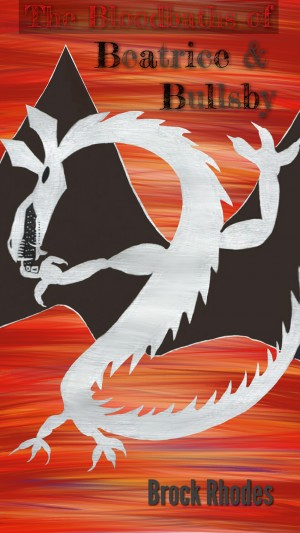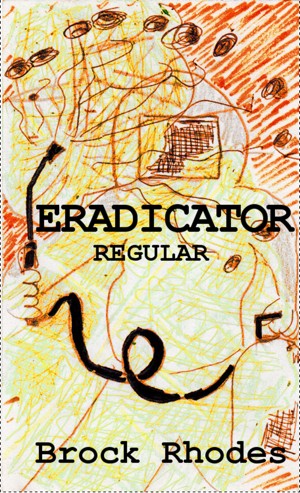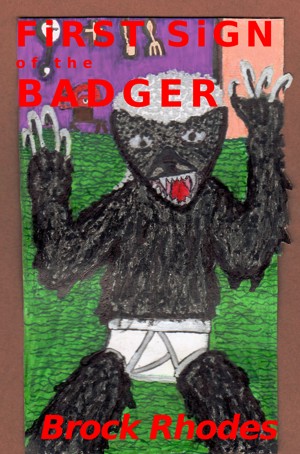Interview with Brock Rhodes
Published 2014-03-08.
When did you first start writing?
Before I knew how to. I mean that literally. I began writing before I knew what sentences were or even how to spell. Back then I made comic books. I was about 4 or 5 years old when I started. I remember having laminated cards on rings they'd send home with me from school with words on them I was learning to spell. I'd get incredibly bored writing them over and over again, so then I'd just think about them and try to fit them in a phrase or a sentence on a page. Then I'd build on them and branch out and waste all over my homework time on my own thing so I'd throw my homework away and either tell the teacher I lost it or I never got one. I lied a lot as a little kid until I realized the adults couldn't really kill me. I started out adding words to my comics and I remember thinking about how this opened up a lot of possibilities to take me where I was going with it. After awhile I realized how much quicker writing was than drawing, so I don't draw much anymore. I still do a little. I do my book covers and some paintings and other random things.
What's the story behind your latest book?
Which one? The one I last published? The one I'm about to publish? Or the one I'm taking notes on to publish in the near future?
The first ebook I released was "First Sign of the Badger." It's a collection of short stories from when I was a lad. Some of them won awards back then. What exactly those were I don't remember. But I know that "Car Wash Safari," "The Father's Day to End All Father's Days," and "Mirrors Don't Look Alike" were all recognized somewhere. "Car Wash Safari" was actually taught as the example for a process essay at a junior college. I wrote it for the process essay requirement for the English class there, but I did it in a narrative form. The professor was blown away. I had to write two or three pages. I gave her something like thirteen that filled the requirements and included what amounts to an explanation of why I have difficulty doing down to earth things sometimes. The goal of that book was just to make an ebook because it was something that I hadn't done before. It is surely flawed, but I learned a lot about the process from it.
"Eradicator: Regular" is the first part of a larger series, the "Eradicator" series. It's about this guy who works for this giant pest control company that sends him all over Kansas. It's the first new material I've released in years. It was important to me to release something new so I can figure out a bit more from the process of making these ebooks.
My next two releases are pretty much figured out. One will be "Goddamn Finger Tube," which is a story I wrote many years ago and it opened a lot of doors for me. Doors which I slammed shut, merrily and without regret. It's about a world famous columnist who decides to take a day off in a bid for immortality, but all Hell breaks loose. The other is, "What's A Dragon Gotta Do?" which is my style of a sword and sorcery tale set in fifteenth century England. That book is about a lot of things. The title refers to lonely dragons who show up to kidnap the seven loveliest women of a village, but there is a lot more going on there.
I have many more I plan to release in the near future. I have an extensive catalog of stories.
What motivated you to become an indie author?
I got out of the writing game for awhile. I was, and still am, very interested in making movies. I took a fantastic detour that was all sorts of horrible and amazing (and in no way movie related) and that I wouldn't trade for anything. When I came back I was delighted to see how little the opinions and motivations of publishers matter, so I aim to take advantage of it. It's what I always wanted. I don't see it as "becoming an indie author" as much as I see it as publishing while realizing my vision and retaining my humanity. It's always been either my way or no way. Now it's no problem.
What is the greatest joy of writing for you?
I do it for my own amusement. I have an irresistible urge to write and create things. If I don't or I can't I have to suppress it and I feel like I'm dying. I don't mean just free writing, or marking up a page or a screen and hoping to make some sense out of it. I always have a story to tell which I have to deliver. I don't wonder where my ideas come from. I know where they come from.
Do you remember the first story you ever wrote?
One of the first comic book series I wrote was about an alien dinosaur, sort of a T-Rex, which crash landed on Earth and met this boy. They got along great, but the boy knew how much his alien dinosaur friend would freak out people if they saw him. So, he'd be mindful to hide him, but he was always discovered and every comic would always end with the police and military shooting the dinosaur alien to bits in a very bloody and extremely horrible ending. I made a lot of these. I'd staple them together like they were a real comic book and I'd work on them at school. One of my teachers inspected it because she wondered what I was doing. I think she thought I was taking notes or something. I remember thinking that she'd be mad. But after she saw it, and how many I made she told me she thought they were great and put them out on this table where my classmates got their stuff to read during our chill time. They had a good run there in the little classroom. It was generally well received. Except there was a girl in my class who was about a foot taller than me who confronted me about the violence in the comics. Then she proceeded to kick my shin and whatever else she could until the teacher pulled her off of me. She hurt my shin and I was in the nurse's office waiting for my Dad to take me to the doctor and she was in the Principal's office, which was right next to it. The Principal didn't know what to do with her, so he grabbed her by the arm and brought her over to me and demanded she apologize by asking her, "What do you say to him?" She said, "Thank you," to me, and we all had a good laugh.
Do you remember the first story you ever read, and the impact it had on you?
The first book I ever read was "Mouse and the Motorcycle" by Beverly Cleary. Took me a little over two years to read it. It didn't have an emotional impact on me or really broaden my horizons. By that point I had written so many stories that I decided I had better read a book, so I made it that one and I stuck with it. I was much more interested in reading nonfiction, and I generally still am. After I got into junior high I refused to read any more fiction books. It was a stance I kept through my 20s, outside of a few things I had to read for college. All the other book reports I had to do were totally faked. It was easy. Anyway, my stance, which was incredibly unpopular with anyone who called itself a writer was dubbed by them as "Brock's Paradox." Which I always found funny in an art imitating life sort of way, because it isn't a paradox. I refused to read fiction because I didn't want reading fiction to affect me as a writer of fiction. I didn't want to be a regurgitator as so many are. In recent years, since I'm not concerned about other writers influencing me anymore, and I stumbled on this strange phenomenon of lists claiming to contain the titles of the 100 greatest novels of all-time, I decided to go for it. I made a spread sheet of these lists and developed a point system to get a better idea of which these fiction books were considered by the listmakers as the best and I at least perused most of them. I expected to be blown away, which I was - with disappointment. Half of it I couldn't stand. But I did find some gems. I'm a big fan of Kurt Vonnegut's "Slaughterhouse Five" and "Cat's Cradle." I also hold Chinua Achebe's "Things Fall Apart" in very high regard.
Smashwords Interviews are created by the profiled author or publisher.
Books by This Author
The Bloodbaths of Beatrice & Bullsby
by Brock Rhodes
As war rages around them in this confusing world, commonfolk struggle to survive. As a result they change as a people. They become practical and ruthlessly hardnosed. When it seems they have things figured out, and they may reach a happy ending, a new threat emerges from out of this world, stirring up doubt, once again, in all they believe in.
Eradicator: Regular
by Brock Rhodes
The first episode of the Eradicator series follows a typical day of an exterminator, Joe Maximo, as he handles a slew of problems all over Kansas. In and out of houses and businesses, up and down the road, Joe is a passenger at the mercy of the fate of each stop. Naturally, he is a prisoner to the madness of others who call on him to solve their problems and to kill for them.
First Sign of the Badger
by Brock Rhodes
First Sign of the Badger is a wildly inconsistent collection of writings from my youth. Award winning short stories are mixed with poems from grade school and memoirs of early adulthood. The topics vary greatly. From a narrative process essay about washing your car, to stories about greed and love, a poem about having dry hands, and more... There's likely something here for everyone.



